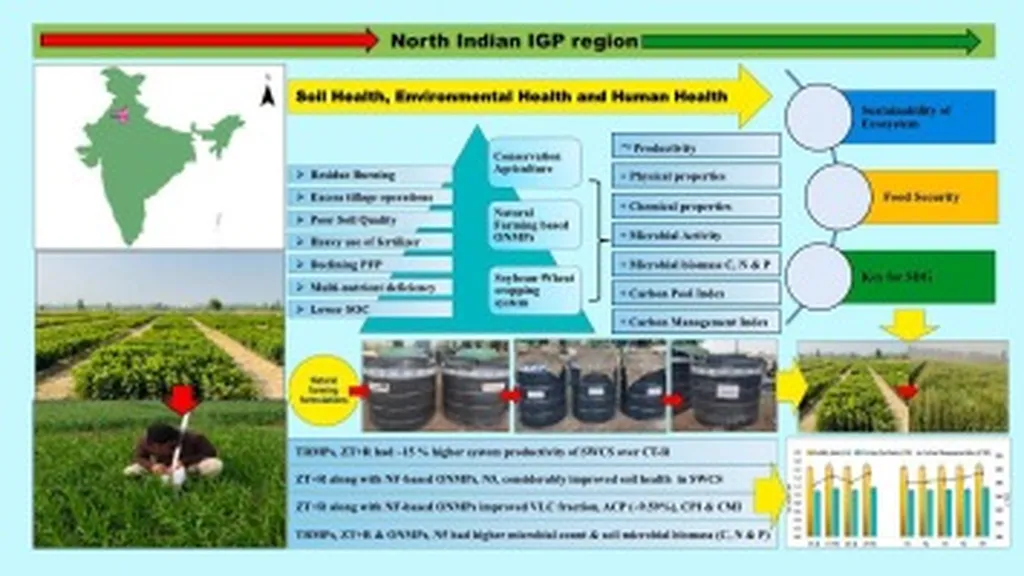In the heart of India’s Punjab region, a groundbreaking study led by Arun Kumar from the Department of Agronomy at Punjab Agricultural University, Ludhiana, is challenging conventional agricultural practices and offering a promising path towards sustainable farming. Published in the journal ‘Frontiers in Agronomy’ (translated to ‘Frontiers in Field-Crop Science’), the research evaluates the impact of intensified conservation agriculture-based cropping systems on soil health and nutrient availability, with implications that could resonate far beyond the fields of Punjab.
The study, conducted over two years, compared six different cropping systems, each with unique combinations of crops and management practices. The standout performer was the soybean-wheat-mungbean system under permanent beds with residue retention, labeled as S6. This system demonstrated significant improvements in soil properties, including a 4.4% decrease in bulk density and a 45.6% increase in infiltration rate compared to the conventional rice-wheat-mungbean system under conventional tillage without residue retention (S1).
“Our findings indicate that the soybean-wheat-mungbean system with residue retention and permanent beds can substantially enhance soil health and nutrient dynamics,” Kumar explained. This system showed the highest microbial biomass, enzymatic activity, and basal soil respiration (BSR), with dehydrogenase activity (DHA) and BSR increasing by 58.5%–64.6% compared to the conventional system.
The research also highlighted improvements in micro-nutrients like zinc, iron, manganese, and copper, which were enhanced by 10%, 39%, 8%, and 63%, respectively, in the S6 system over the conventional S1 system. These findings suggest that conservation agriculture-based systems can play a pivotal role in sustainable agriculture, offering a viable alternative to traditional practices.
The commercial impacts of this research are profound, particularly for the energy sector. Healthier soils with improved nutrient dynamics can lead to increased crop yields, reducing the need for synthetic fertilizers and pesticides. This not only lowers production costs but also minimizes the environmental footprint of agriculture. Additionally, enhanced soil health can contribute to carbon sequestration, mitigating the effects of climate change and potentially opening up new avenues for carbon credits and green energy initiatives.
The study’s results are a testament to the potential of conservation agriculture in transforming traditional farming practices. By adopting systems like S6, farmers can improve soil sustainability, enhance nutrient availability, and contribute to a more resilient agricultural ecosystem. As the world grapples with the challenges of climate change and food security, this research offers a beacon of hope and a practical pathway towards sustainable agriculture.
Kumar’s work, published in ‘Frontiers in Field-Crop Science’, underscores the importance of innovative cropping systems in shaping the future of agriculture. It serves as a call to action for farmers, policymakers, and researchers to embrace conservation agriculture and pave the way for a more sustainable and productive future. The findings not only have the potential to revolutionize farming practices but also to inspire further research and development in the field of agritech, driving forward the global agenda for sustainable development.

